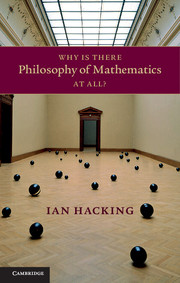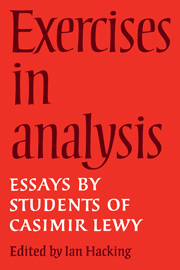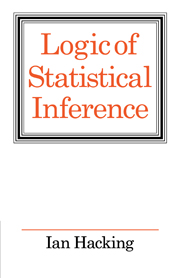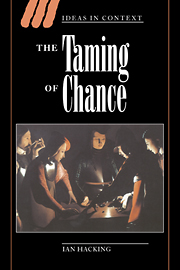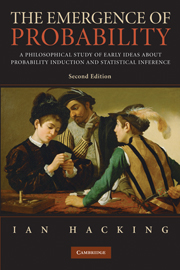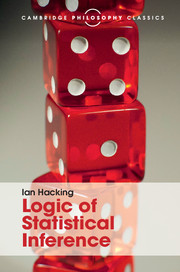Why Is There Philosophy of Mathematics At All?
- Author: Ian Hacking, University of Toronto
- Date Published: January 2014
- availability: Available
- format: Paperback
- isbn: 9781107658158
Paperback
Other available formats:
Hardback, eBook
Looking for an inspection copy?
This title is not currently available on inspection
-
This truly philosophical book takes us back to fundamentals - the sheer experience of proof, and the enigmatic relation of mathematics to nature. It asks unexpected questions, such as 'what makes mathematics mathematics?', 'where did proof come from and how did it evolve?', and 'how did the distinction between pure and applied mathematics come into being?' In a wide-ranging discussion that is both immersed in the past and unusually attuned to the competing philosophical ideas of contemporary mathematicians, it shows that proof and other forms of mathematical exploration continue to be living, evolving practices - responsive to new technologies, yet embedded in permanent (and astonishing) facts about human beings. It distinguishes several distinct types of application of mathematics, and shows how each leads to a different philosophical conundrum. Here is a remarkable body of new philosophical thinking about proofs, applications, and other mathematical activities.
Read more- Addresses the experience of doing mathematics
- Treats mathematics as an aspect of human nature
- Explores how the distinction between pure and applied mathematics came into being
Reviews & endorsements
'Hacking does not restrict himself to the foundations of mathematics, but dares to cover both the breadth and the depth of mathematical philosophy.' Literary Review of Canada
See more reviews'… readable, presented in easily digestible chunks, clearly explained, and just a lot of fun …' Danny Yee's Book Reviews
'Show[s] non-specialists … the sort of distinctive contribution to science and maths that a brilliant, very well-informed, philosopher can bring … I thoroughly recommend this book.' Alan Weir, The Times Literary Supplement
'Hacking has composed a great overview of our understanding of mathematics and of the historical turning points and philosophical basics.' Peeter Müürsepp, Mathematical Reviews
Customer reviews
Not yet reviewed
Be the first to review
Review was not posted due to profanity
×Product details
- Date Published: January 2014
- format: Paperback
- isbn: 9781107658158
- length: 304 pages
- dimensions: 228 x 152 x 17 mm
- weight: 0.46kg
- availability: Available
Table of Contents
Foreword
1. A Cartesian introduction
2. What makes mathematics mathematics?
3. Why is there philosophy of mathematics?
4. Proofs
5. Applications
6. In Plato's name
7. Counter-Platonisms
Disclosures.
Sorry, this resource is locked
Please register or sign in to request access. If you are having problems accessing these resources please email [email protected]
Register Sign in» Proceed
You are now leaving the Cambridge University Press website. Your eBook purchase and download will be completed by our partner www.ebooks.com. Please see the permission section of the www.ebooks.com catalogue page for details of the print & copy limits on our eBooks.
Continue ×Are you sure you want to delete your account?
This cannot be undone.
Thank you for your feedback which will help us improve our service.
If you requested a response, we will make sure to get back to you shortly.
×
